Ever watched your furry friend turn away from a favorite meal and wondered, “Why is my dog not eating?” If so, you’re not alone. What if that simple refusal to eat signals something far more serious than a picky palate? Let’s unravel the truth behind your dog’s loss of appetite—and what you can do about it.
- The most common reasons why dogs stop eating
- How to recognize warning signs and when to call your vet
- Tips and actionable steps to encourage your dog to eat
- The difference between a fussy eater and a more serious underlying illness
Ever Wondered: Why Is My Dog Not Eating? Unraveling the Mystery Behind Your Dog’s Loss of Appetite
Every dog owner faces it eventually: a beloved dog refuses to eat, skipping meals or pushing away a once-loved dog food bowl. Understanding why is my dog not eating? can be confusing and worrying. Dogs may turn down their meals for a variety of reasons, from mild behavioral quirks to serious health conditions. For some dogs, this lack of appetite could merely be a response to changes in their daily routine or surroundings, while for others, it’s a warning sign of an underlying illness that needs urgent attention.
The key is knowing the difference. For example, if your pup is still playful and drinking water, it might just be a case of fussiness or stress. But if your dog stops eating and exhibits symptoms such as vomiting, diarrhea, or lethargy, it’s essential to contact your vet immediately. Addressing the question “why is my dog not eating?” early on, and with practical solutions, can make all the difference in your dog’s health and happiness—or even save their life.
10 Common Reasons Why Is My Dog Not Eating?
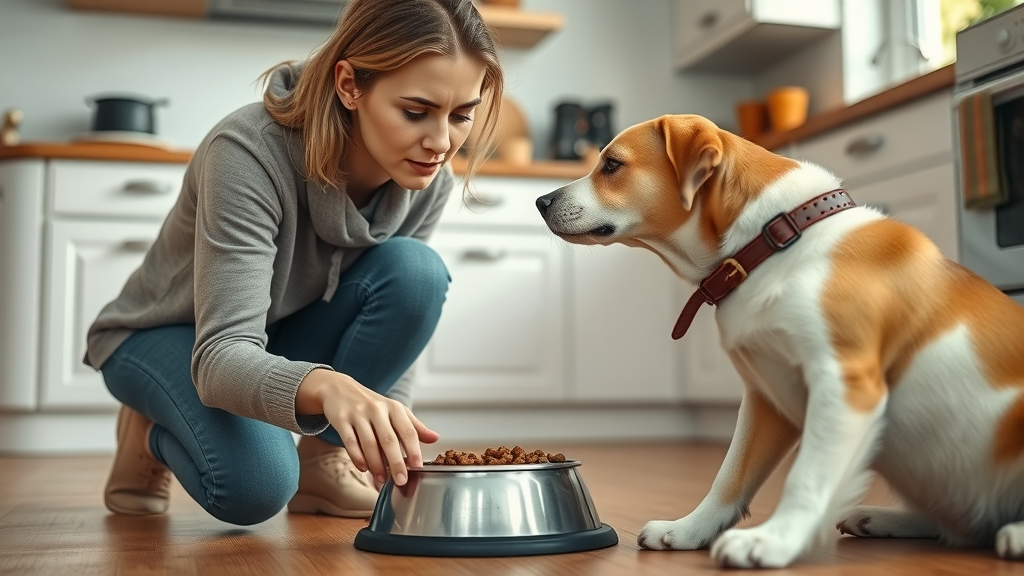
-
Stress and Environmental Changes: How Life Events Affect Your Dog's Appetite
Dogs thrive on routine and safety. Major changes, such as moving house, welcoming a new pet or baby, or frequent visitors, can stress your dog out. Stressful situations can cause even the hungriest dog to stop eating. If your routine has changed recently, consider whether this could be a trigger for your dog’s loss of appetite. Calming strategies or a return to a predictable schedule often help your dog to eat normally again.
-
Dental Disease: The Painful Secret Behind Dog Not Eating Regularly
Dental disease is a leading culprit behind a dog not eating. Painful gums, loose or infected teeth, or mouth sores can make eating kibble, dry food, or even soft food a miserable experience. If your dog paws at their mouth, drools more than usual, or only eats on one side, dental issues may be to blame. Regular dental checkups can prevent and quickly resolve this common and underestimated problem.
-
Changes in Dog Food: Why Sudden Swaps or Low-Quality Diets Cause Lack of Appetite
Dogs can be creatures of habit, especially when it comes to their meals. A sudden switch in dog food brand, variety, or even the shape of kibble may cause your dog to refuse to eat. Additionally, rancid, expired, or low-quality dog food can cause a loss of appetite or even mild nausea. When making dietary changes, always introduce new foods gradually to avoid overwhelming your dog’s digestive system—and never underestimate your dog’s nose for freshness.
-
Fussy Eater Syndrome: Understanding Selective Eating Habits
Some dogs develop preferences for certain dog foods, textures, or feeding environments, making them seem like a fussy eater. If you regularly offer new foods, treats, or table scraps, your dog may wait for tastier “human food” instead of regular meals. While this may not always signal an illness, it can set up unhealthy eating habits that can be difficult to break.
-
Medical Conditions and Underlying Illness Causing Your Dog to Reject Food
Serious health problems—including infections, kidney disease, liver failure, pancreatitis, cancer, or other underlying illnesses—can cause your dog to stop eating. These medical conditions are often accompanied by other symptoms such as vomiting, diarrhea, lethargy, or significant changes in behavior. If your dog refuses food for more than a couple of days, especially if you notice other physical changes, contact your veterinarian promptly.
-
Medication Side Effects as a Reason for Your Dog Not Eating
Certain medications can cause gastrointestinal upset, altered taste, or nausea, resulting in a decreased appetite. Always check with your veterinarian if your dog is on new medication or their eating habits change suddenly after starting a prescription.
-
Age-Related Changes in Taste and Eating Habits
Puppies, senior dogs, and those with chronic health conditions may experience shifts in taste, smell, or digestive comfort, impacting their appetite. Older dogs may also struggle with dry food or need softer meals. If your dog is aging, monitor for changes and adjust meal options with your veterinarian’s guidance.
-
Behavioral Issues: Anxiety, Fear, or Attention-Seeking
Dogs who experience separation anxiety, fear during thunderstorms, or compete for your attention may lose interest in meals. Sometimes, this is simply a way to get more of your attention or better treats. Observing your dog’s behavior during mealtimes can help determine if this is the culprit.
-
Overfeeding Treats or Table Scraps
Generous helpings of treats, table scraps, or human food can spoil your dog’s regular appetite or cause them to reject balanced dog food. Reducing snacks and establishing structured meals can help restore healthy eating habits.
-
Physical Obstructions and Gastrointestinal Issues
Swallowed objects, gastrointestinal blockages, or even digestive disease can make swallowing painful or impossible. If your dog’s lack of appetite is accompanied by retching, abdominal swelling, or distress, call your vet immediately—these scenarios can quickly become life-threatening.
| Reason | Description | Action Needed | Example |
|---|---|---|---|
| Stress/Change | Routine disruption, travel, new pet/home | Restore normalcy, provide comfort | Dog stops eating after moving house |
| Dental Disease | Painful teeth/gums | Vet dental checkup | Dog refuses to eat kibble |
| Food Changes | New food type or poor quality/stale dog food | Switch back or transition slowly | Dog not eating after starting a new food |
| Fussy Eater | Selective eating or expecting treats | Limit treats, establish routine | Dog waits for table scraps instead of dog food |
| Underlying Illness | Infections, organ or medical condition | Contact your vet | Loss of appetite + vomiting |
Identifying a Dog Not Eating: Warning Signs and When to Call Your Vet
Recognizing when a dog not eating is a cause for concern can be difficult. It’s important to watch for a significant change in your dog’s eating habits, as well as related symptoms. If a typically eager eater turns away from their dog food for more than a couple of days, or you notice accompanying symptoms such as vomiting, diarrhea, or listlessness, it’s time to contact your vet. Remember, prompt action can often prevent a simple case of decreased appetite from becoming a medical emergency.
Changes in appetite may not always signal danger, but the presence of other alarming symptoms increases the urgency. For example, behavioral shifts, such as hiding or vocalizing in pain, can indicate underlying problems. Always take note of how long the issue persists and whether your dog’s appetite fluctuates with changes in environment or stressors. If in doubt, reaching out to your veterinarian ensures that any underlying illness is identified early.
Is a Lack of Appetite Always Serious? Distinguishing Fussy Eater Habits From Emergency Medical Conditions
Not every skipped meal means an emergency. Dogs who are simply being a fussy eater might leave their dog food untouched but remain playful, energetic, and otherwise healthy. However, if your dog’s decreased appetite is combined with lethargy, visible pain, sudden weight loss, or symptoms such as vomiting and diarrhea, these are red flags for a potential underlying illness. Emergency intervention may be needed if these symptoms progress rapidly or your dog refuses food for more than 24-48 hours.
Key differences between normal fussiness and a medical condition include the duration of symptoms, the presence of other clinical signs, and any recent changes in routine, diet, or medication. Trust your instincts: if your dog stops eating and seems “off,” it’s always better to call your vet rather than risk serious complications.
Common Symptoms Accompanying a Dog Not Eating
- Lethargy (less energy than normal)
- Vomiting or diarrhea
- Drooling or pawing at the mouth
- Bad breath (possible dental disease)
- Visible signs of pain or swelling in the belly
- Sudden weight loss or dehydration
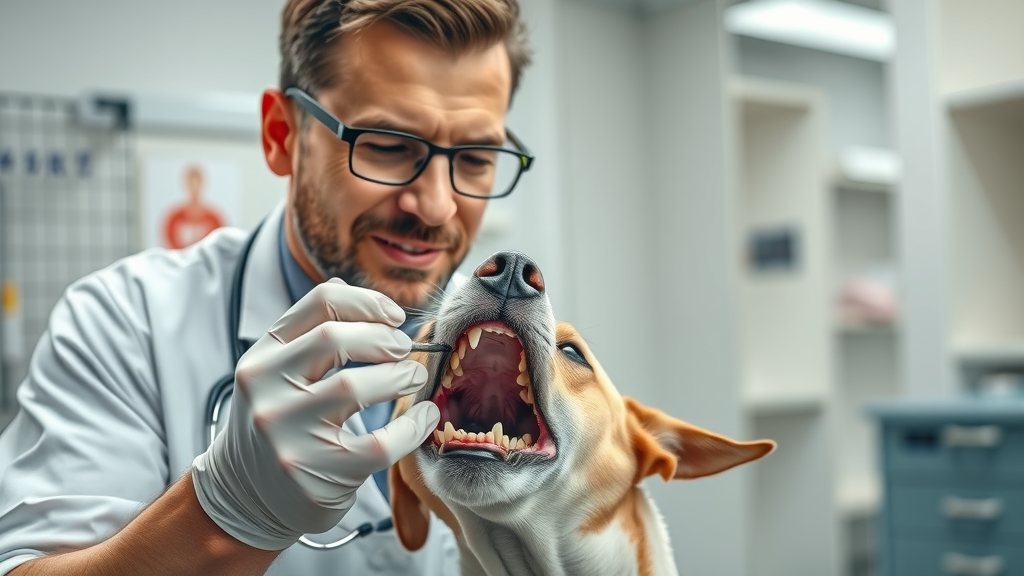
If you see any combination of these symptoms, contact your veterinarian immediately for guidance.
When and Why to Call Your Vet for a Dog Not Eating
As a general rule, call your vet if your dog refuses to eat for over 24-48 hours , especially if you notice severe symptoms such as vomiting, diarrhea, lethargy, or significant behavior changes. Early medical attention can catch life-threatening conditions before they escalate, ensuring your pet receives timely care. Trust your instincts; you know your dog best, and a simple phone call could make all the difference in your pet’s outcome.
"When in doubt, a timely call to your vet could save precious time and keep your dog safe."
Dog Food: How Diet and Quality Influence Why Is My Dog Not Eating?

The type, quality, and freshness of dog food profoundly affect your dog’s desire to eat. Some dogs may reject dry food after eating wet food or human food, while others simply get bored with the same flavor or texture day after day. Low-quality or expired food, poor storage practices (like leaving bags open), or contaminated dog food can also cause a loss of appetite —sometimes alongside stomach upset or vomiting. Prioritizing premium options and rotating through recommended flavors can keep mealtime exciting and nutritious.
Carefully read ingredient lists, and avoid feeding your dog large quantities of table scraps or unfamiliar foods, which can disrupt both appetite and nutrient intake. Food preferences may evolve as your dog ages, develops certain medical conditions, or experiences stress. Consulting your veterinarian about the best diet for your dog’s age, weight, and health status ensures mealtime stays both healthy and appealing.
Dry Food vs. Wet Food: Which Is More Appealing for Fussy Eaters?
Many fussy eaters prefer the softer texture and stronger aroma of wet food over dry kibble, which can be harsh on sensitive teeth or gums. Wet dog food often proves tempting for seniors, dogs with dental disease, or those recovering from illness. However, dry food offers dental benefits and is easier to store long-term—if your dog will eat it. Mixing a small amount of wet food into dry food, or gently warming the meal, can make it more inviting for a reluctant dog.
Transition changes gradually—never switch cold turkey, as a sudden change in dog food can upset your dog’s stomach and cause more problems than it solves. For persistent problems, talk to your vet about prescription or highly palatable diets designed to support picky, ill, or recovering pets.
How Food Quality and Storage Affect Your Dog's Appetite
Stale, rancid, or expired food is a common—yet often overlooked—cause behind a dog not eating regularly. Store kibble in airtight containers and check best-before dates regularly. Avoid plastic storage bins that can retain oil residues and impart unpleasant flavors to dog food. Always wash your dog’s food and water bowls with hot, soapy water every day, removing bacteria that can quickly build up and deter your pet from eating.
Repeatedly offering poor-quality or improperly stored food may set up negative associations with mealtime, especially for sensitive or fussy eaters. If you suspect freshness problems, open a new bag or try a locally sourced, high-quality food for comparison. Most dogs instinctively avoid food that appears or smells “off”—listen to your dog’s instincts and discard food that seems suspicious.
Good Idea or Not? Switching Dog Food Brands Abruptly
Is it a good idea to swap your dog’s food without warning? Usually—no. Abrupt changes can cause gastrointestinal distress, leading to diarrhea, vomiting, or a refusal to eat. If you plan to update your dog’s meals—whether switching brands, protein sources, or from dry food to wet food—do so gradually by mixing increasing amounts of the new food into the old over 5-7 days. This gentle transition lets your dog’s digestive system adjust and helps prevent a sudden loss of appetite.
If your dog still refuses to eat after a careful switch, reassess both the food and other stressors or medical issues. Sometimes, a conversation with your vet provides new ideas, prescription diets, or appetite boosters tailored for your dog’s unique needs.
Practical Steps to Encourage Your Dog to Eat
Easy Solutions for Mild Cases of Dog Not Eating
- Warming up food : A few seconds in the microwave can release tempting aromas.
- Offering a different dog food flavor : Novelty can entice picky eaters to the bowl.
- Reducing treats and scheduling regular feeding times : Remove excess snacks and feed your dog at set times, not “free choice.”
- Addressing stress or environmental triggers : Create a calm, safe, and consistent mealtime space with limited distractions.
If your dog’s appetite rebounds with these simple steps, you’re likely dealing with a fussy eater, not a medical condition.
Behavioral Tips to Improve Eating Habits
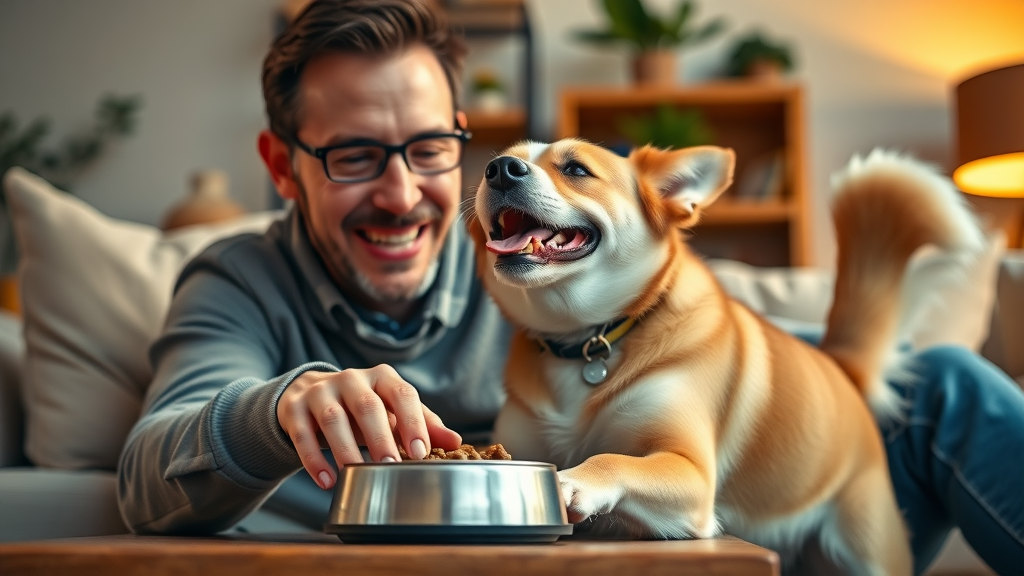
Building healthy eating habits starts with routine. Feed your dog at the same times and in the same spot each day, making mealtimes predictable and stress-free. Praise your dog for eating and avoid scolding or coercion if they don’t—this can make the issue worse. If your dog is distracted by other pets or children, try a quiet, private feeding space. Limit human food and table scraps, as these can make your dog wait or beg and skip real meals. Consistency is the secret weapon for turning mealtime struggles into healthy habits over the long haul.
Remember, emotional well-being matters: anxious pets may benefit from calming tools or environmental enrichment. More walks, play, and social interaction can reduce anxiety and stimulate hearty appetites.
When Home Solutions Fail: Preparing for a Call to Your Vet
If your dog refuses food for more than 24-48 hours despite your best efforts, it’s time to call your vet. Gather the following information to assist your veterinarian:
- Duration of decreased appetite or skipped meals
- Specific foods, treats, or human food recently offered
- Other symptoms (vomiting, diarrhea, lethargy, dental pain, etc.)
- Recent environmental or routine changes
- Current medications or supplements
This detailed, organized approach helps your veterinarian quickly assess whether your dog is just a fussy eater or struggling with a serious underlying illness.
The Role of Dental Disease in Why Is My Dog Not Eating?
Spotting Signs of Dental Pain in Dogs
Dental pain is a common, often hidden reason a dog stops eating. Watch for signs such as drooling, bad breath, pawing at the mouth, chewing only on one side, or refusal to eat hard or dry food. Swollen gums, visible tartar, or discolored teeth also signal dental damage or infection.
Treatment Options for Dental Disease
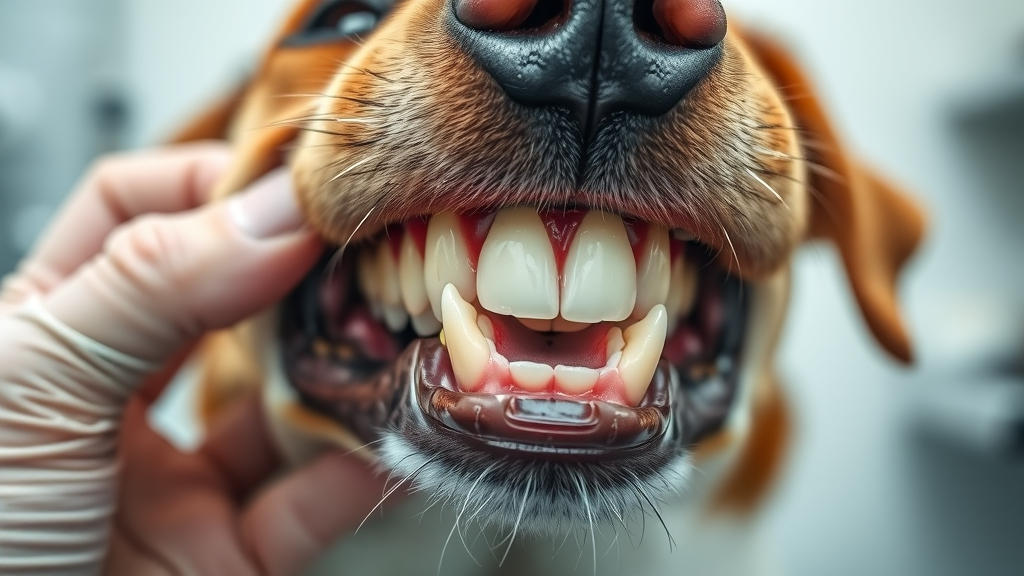
If you suspect dental disease , a veterinary dental exam is essential. Treatments may include professional cleanings to remove tartar, extraction of damaged teeth, antibiotics for infection, or pain relief for sore gums. Prompt treatment restores comfort quickly and helps your dog to eat normally again.
Prevention is easier than cure: brush your dog’s teeth daily or use dental chews and veterinarian-recommended toys to reduce plaque and tartar formation.
Preventing Dental Issues That Cause Lack of Appetite
Regular dental maintenance should be part of your long-term plan for your dog’s health. Schedule professional cleanings as recommended by your vet, offer dental-friendly foods and toys, and check your dog’s mouth at home for signs of discomfort. Address dental problems early to prevent pain, infections, and the refusal of food due to avoidable mouth troubles.
Understanding Underlying Illness When Your Dog Will Not Eat
Common Health Conditions That Lead to Reduced Eating
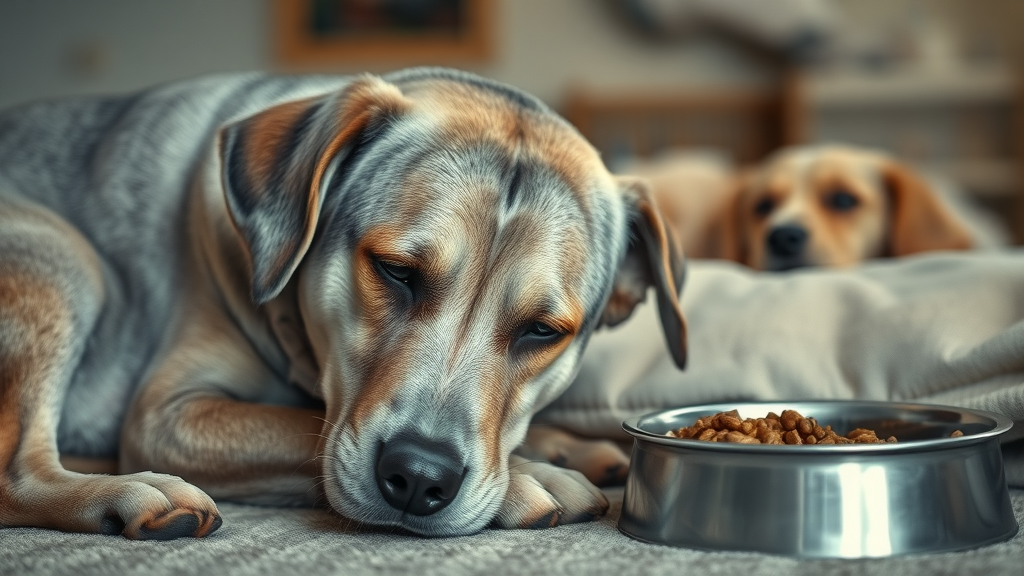
Beyond dental disease, numerous medical conditions can cause a sudden or gradual loss of appetite. Common culprits include organ failure (kidney or liver), pancreas issues, infections, diabetes, anemia, gastrointestinal blockages, and cancer. Each of these illnesses may present additional symptoms, such as vomiting, abdominal swelling, weakness, or labored breathing. Early recognition is critical—untreated, many of these diseases progress rapidly.
How Your Vet Diagnoses and Treats Underlying Problems
Your vet will use a combination of a physical exam, blood tests, urine tests, X-rays, and possibly ultrasound to determine the root cause of decreased appetite. Once identified, your vet may recommend treatments such as hydration, medications, dietary changes, or surgery. Never attempt to diagnose or treat your dog’s illness at home—professional expertise is key to safe and successful outcomes.
People Also Ask: When to Worry About a Dog Not Eating?
Answer: Generally, if your dog has skipped more than one or two meals, especially combined with vomiting, diarrhea, or lethargy, it's time to call your vet.
People Also Ask: What to Do When a Dog Is Not Eating?
Answer: Start by reviewing food, feeding environment, and stress triggers. Try small diet changes or gently warming the food. Always consult your vet if the issue persists.
People Also Ask: How Long Is It Okay for a Dog Not to Eat?
Answer: Healthy adult dogs shouldn't go more than 24-48 hours without eating. Puppies, seniors, or sick dogs may need urgent attention sooner.
People Also Ask: Why Has My Dog Suddenly Stopped Eating His Food?
Answer: Sudden loss of appetite could be due to stress, food quality, dental disease, or underlying illness. Monitor other symptoms and call your vet if concerned.
When to Call Your Vet: Key Scenarios for a Dog Not Eating
Situations When Immediate Veterinary Care Is Essential
- Refusal of food for more than 48 hours
- Accompanying symptoms such as vomiting, diarrhea, or lethargy
- Signs of pain, dental disease, or abdominal swelling
Frequently Asked Questions About Why Is My Dog Not Eating?
-
What cancers cause a dog to stop eating?
Several cancers (such as lymphoma, gastrointestinal tumors, and liver cancers) can cause a lack of appetite. If you notice persistent refusal to eat and other symptoms, consult your veterinarian promptly. -
Are small breeds more prone to fussy eating?
Yes, some small breeds—like Yorkies, Maltese, or Chihuahuas—tend to be more selective eaters. They may also be more sensitive to changes in food or environment. -
Can seasonal changes affect my dog's appetite?
Seasonal shifts can sometimes influence a dog’s appetite, especially if routines, activity levels, or weather change significantly. Usually, this is temporary, but monitor for ongoing loss of appetite or other symptoms.
Encouraging Healthy Eating Habits and Monitoring Your Dog Long-Term
Creating Consistent Routines for Your Dog to Eat
Dogs thrive on consistency. Feed your dog at the same times each day, limit distractions, and avoid excessive treats. Praise calm behavior around mealtime and stick to routines even when your own schedule gets busy. This helps reduce picky habits and supports healthy digestion.
Long-Term Prevention Strategies: Diet, Dental Care, and Regular Vet Visits
Maintain a balanced diet, ensure daily dental hygiene, and schedule twice-yearly vet checkups. Regular monitoring allows for early detection of medical conditions before they affect your dog’s appetite. Prevention, not just reaction, protects your dog’s health now and into old age.
| Symptom | Fussy Eater | Underlying Illness |
|---|---|---|
| Energy Levels | Normal, playful | Low, lethargic |
| Other Symptoms | None or only food refusal | Vomiting, diarrhea, pain, weight loss |
| Response to Food Changes | May eat new food/treats | Refuses all food |
| Duration | Less than 24-48 hours | More than 24-48 hours |
"Not every missed meal is an emergency, but every change in eating habits deserves your attention."
Subscribe for More Trusted Pet Advice!
- We can’t teach your dog to sit — but we can deliver great pet advice every month. 🐕 Subscribe to the newsletter and fetch some fun!
Act early when your dog not eating becomes a worry—observe closely, improve the environment, try simple adjustments, and always call your vet if problems persist. Your vet is your best ally for a happy, healthy dog.
If you’re concerned about your dog’s loss of appetite, two authoritative resources can provide further insights. The article “ Why Is My Dog Not Eating? Causes and What To Do ” from PetMD offers a comprehensive overview of potential medical and behavioral reasons behind a dog’s refusal to eat, along with guidance on when to seek veterinary care. Additionally, the American Kennel Club’s piece, “ Why Won’t My Dog Eat? Learn About Reasons Why Your Dog Isn’t Eating ,” delves into various factors affecting canine appetite and provides practical tips to encourage eating. If you’re serious about understanding and addressing your dog’s eating habits, these resources will offer valuable information and actionable advice.
 Add Row
Add Row  Add
Add 




Write A Comment